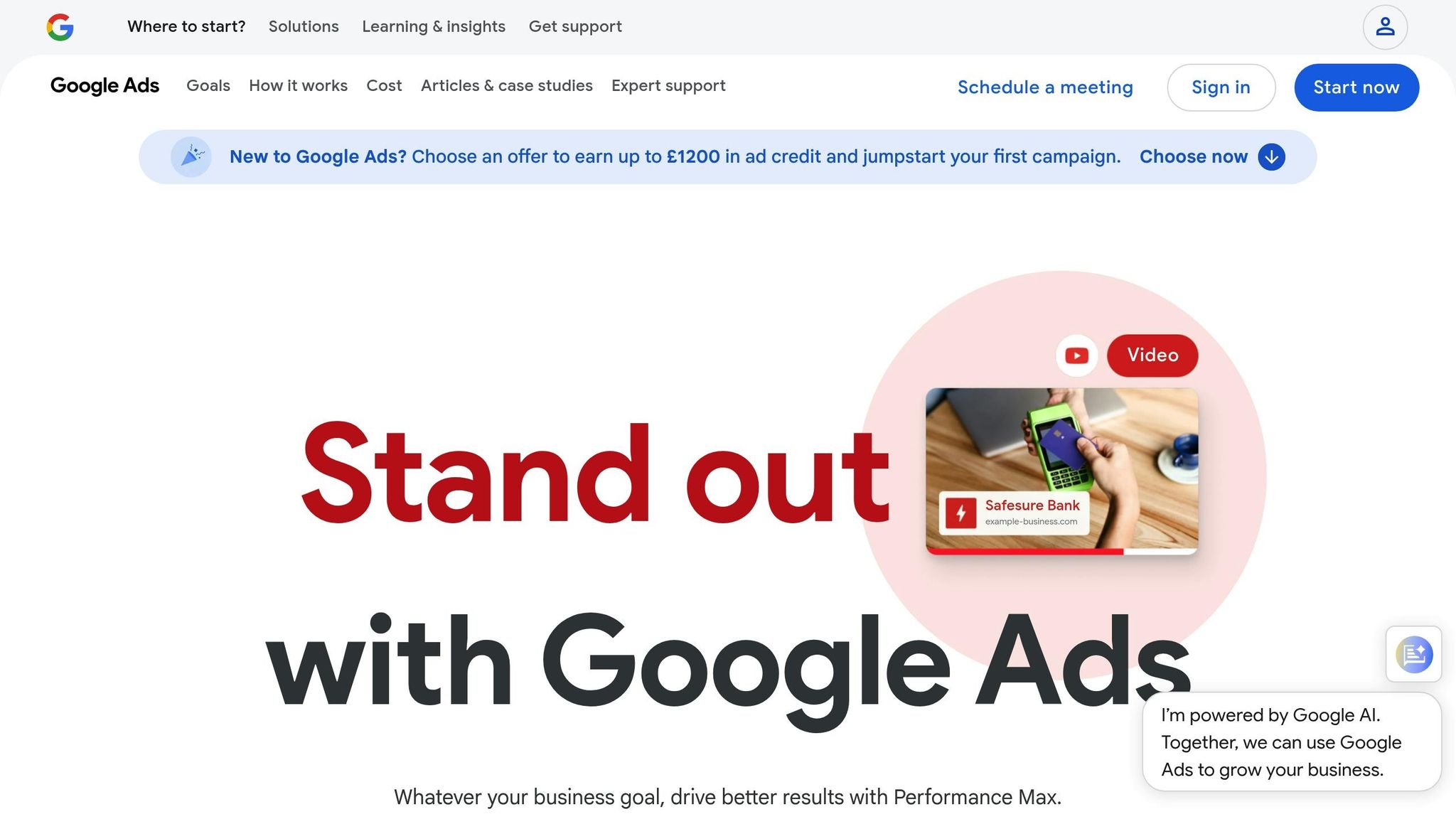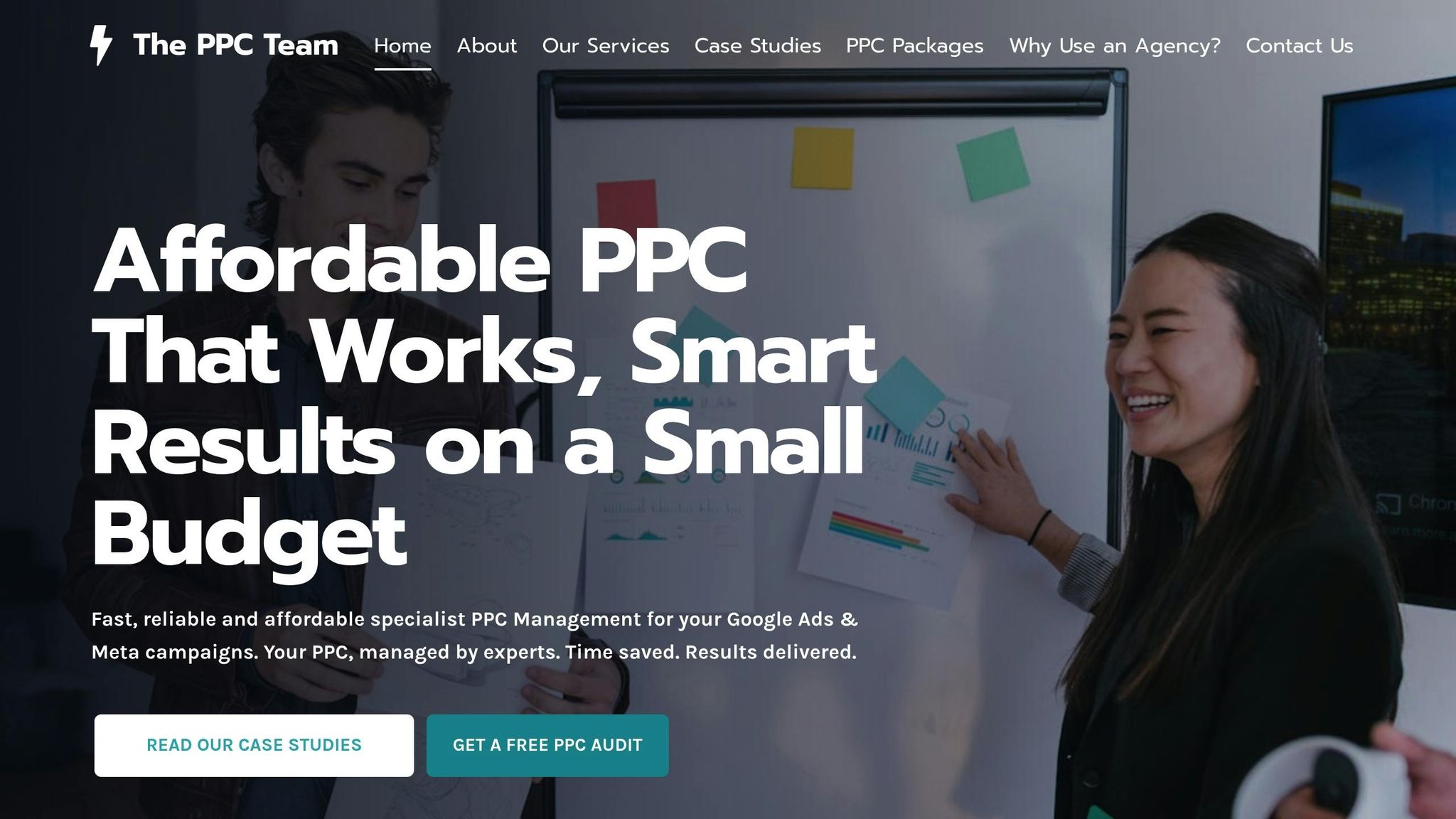What to Expect When Working with a Google PPC Agency (The Good, Bad, and Meh)
When hiring a Google PPC agency, you’re outsourcing the management of your paid search campaigns to experts. This can save you time, improve performance, and help you focus on your business. However, it’s not all smooth sailing. Here’s a quick look at what you’ll encounter:
- The Good: Agencies bring expertise, better ROI, and handle all the complex tasks like keyword research, bidding, and tracking. They save you time and often use premium tools to maximise results.
- The Bad: Costs can get high, communication may be slow, and you might lose some control over your campaigns. Misaligned priorities or unclear reporting can also be frustrating.
- The Meh: Standard processes, like regular reports and industry approaches, are reliable but not very personalised. Communication schedules and deliverables tend to feel routine.
Working with an agency can be a game-changer, but it’s essential to manage expectations, clarify budgets, and ensure they understand your business goals. Choose a partner that feels like an extension of your team, not just a service provider.
The Good: Benefits of Working with a Google PPC Agency
Expert Campaign Management
When you partner with a professional agency, you gain access to a team of certified specialists who know the ins and outs of Google Ads. They understand the importance of negative keywords, the nuances between exact match and broad match, and how to structure ad groups to boost Quality Scores. They also know which ad extensions can make your ads more appealing and increase click-through rates.
Agencies often leverage premium tools for competitor analysis, keyword research, and tracking performance. By analysing your market, they create tailored strategies designed to achieve real business results – not just generic, cookie-cutter campaigns. This level of expertise not only fine-tunes your ad structure but also lays the groundwork for better ROI and smarter use of your resources.
Better ROI and Performance
With expert management comes improved performance. Agencies use optimised bidding strategies and carefully chosen ad placements to help lower your cost-per-click while increasing conversion rates. They also implement advanced conversion tracking systems, giving you a clear picture of which keywords and ad variations are driving revenue.
Performance audits are a regular part of their process. By consistently reviewing and adjusting your campaigns, agencies can reduce your cost-per-acquisition while increasing the number of qualified leads or sales. This constant refinement ensures your advertising budget works as hard as possible.
Time and Resource Savings
Beyond improving performance, working with an agency saves you time – lots of it. Managing Google Ads involves time-consuming tasks like keyword research, creating ads, and analysing data. For many business owners, this is time better spent focusing on core operations.
Agencies handle all the technical details, from setting up conversion tracking and integrating analytics to managing audience lists and ensuring compliance with Google’s advertising policies. They also make it easier to scale your campaigns, whether you’re expanding into new markets or preparing for seasonal promotions. By entrusting these tasks to experts, you avoid the platform’s steep learning curve and free yourself to concentrate on running your business while they manage the complexities of paid advertising.
Should you manage your own Google Ads or hire an agency? [Inside Google Ads Episode 43]

The Bad: Problems and Challenges to Watch For
While partnering with a Google PPC agency can bring plenty of advantages, it’s equally important to understand the challenges that might come your way. Being aware of these potential pitfalls can help you navigate the relationship more effectively and set realistic expectations.
Costs and Budget Concerns
Agency fees are often tied to your ad spend – typically calculated as a percentage – which can quickly add up. On top of that, additional charges for services like landing page creation or access to premium tools can stretch your budget further. If the agency has minimum spend requirements, it may push you to allocate more than you’re comfortable with.
Another issue lies in how budgets are allocated. Agencies might favour campaign types that generate higher fees for them, even if those campaigns don’t align perfectly with your business goals. This misalignment can leave you questioning whether your budget is being spent in the most effective way.
Communication Challenges
Poor communication is a frequent pain point in agency relationships. You might encounter slow replies or reports that lack clarity. Smaller accounts, in particular, may be assigned to less experienced managers, which can lead to a lower level of strategic input than you’d expect.
Misaligned expectations can also create tension. For example, while you might hope for daily updates – especially during a campaign launch or a performance dip – many agencies stick to weekly or monthly reporting schedules. This gap can leave you feeling out of the loop when you need answers quickly.
Other factors, like technical jargon in reports, can make matters worse. Terms such as "impression share" or "enhanced CPC" might be thrown around without much explanation, leaving you struggling to interpret the data. Add time zone differences into the mix, and even small adjustments can take longer than anticipated, further complicating communication.
Reduced Control Over Campaigns
When you hand over your campaigns to an agency, you’ll inevitably lose some control. This lack of direct access can delay quick actions, such as adjusting budgets or pausing underperforming ads. Agencies often operate with strict protocols, which can slow down urgent changes.
Some agencies might even restrict your access to the Google Ads account, granting only viewing permissions. This means you’ll have to rely on them for tasks like adding negative keywords or tweaking ad settings – actions you might want to handle yourself in real-time.
The decision-making process can also become more drawn out. What used to be a quick internal decision may now involve lengthy discussions, waiting on analysis, and back-and-forth deliberations with the agency. In fast-moving industries, this slower pace can be a major drawback.
Additionally, there’s a risk that your brand voice and messaging may take a back seat. While agencies are skilled at crafting ad copy that meets technical standards, it might not always capture your brand’s unique tone or resonate with your audience as effectively as you’d like.
Here’s a quick breakdown of common challenges, their potential impacts, and how you can address them:
| Challenge | Impact on Business | How to Avoid |
|---|---|---|
| Unexpected Costs | Budget overruns from hidden fees | Request a detailed fee breakdown and clarify all potential charges upfront |
| Poor Communication | Slow responses and unclear updates | Define communication expectations and ask for a dedicated account manager |
| Limited Account Access | Delays in making urgent changes | Negotiate for better account access or retain control over critical settings |
| Generic Strategies | Ads that lack your brand’s unique voice | Ensure the agency understands your brand and review all ad copy before launch |
| High Minimum Spends | Pressure to meet spending thresholds you’re uneasy with | Look for agencies offering flexible spending options that fit your budget |
The best way to avoid these challenges is by thoroughly vetting agencies before signing any contracts. During initial discussions, ask detailed questions about their fees, communication practices, and how much access you’ll have to your account. A trustworthy agency will address these concerns upfront and work with you to establish clear expectations from the beginning.
The Meh: Average Aspects of Agency Partnerships
Not every part of working with a Google PPC agency fits neatly into either the "fantastic" or "awful" categories. A lot of the experience lands somewhere in the middle – functional but unremarkable. These are the routine elements you’ll likely come across with most agencies. They get the job done but lack the spark that makes them stand out. Let’s break down these standard aspects.
Standard Industry Approaches
Most PPC agencies stick to tried-and-tested methods that work across various sectors and client needs. They rely on well-established practices like keyword research, bid management, and ad structuring. While these approaches are effective, they can feel a bit impersonal compared to strategies tailored specifically to your business.
The truth is, many successful PPC campaigns follow a familiar pattern. Agencies often start with broad match keywords, refine them based on search term reports, and apply standard tactics like dayparting and location targeting. These methods work, but they’re not exactly groundbreaking.
The tools and platforms agencies use also tend to be the same across the board. Whether it’s Google Ads’ automated bidding features or popular third-party software, the toolkit is fairly predictable. This consistency ensures reliability but can leave you wondering what sets one agency apart from another.
Regular Deliverables
When you work with a PPC agency, you can expect a steady flow of deliverables that keep things on track. Monthly performance reports are a staple, highlighting key metrics and providing campaign recommendations. These reports are practical and informative, but they’re rarely thrilling.
Most reports follow a familiar format: an executive summary, a breakdown of key metrics, campaign highlights, and suggestions for the next steps. While the information is useful, the presentation often feels routine and lacks the creativity to make it engaging.
In addition to reports, agencies provide regular updates on campaign adjustments. These might include adding new negative keywords, tweaking bids, or testing new ad copy. This ongoing maintenance is crucial for campaign success, but it’s the kind of behind-the-scenes work that doesn’t draw much attention.
Performance tracking tools offered by agencies are usually reliable but not particularly impressive. You’ll get dashboards to monitor metrics, automated alerts for significant changes, and historical data comparisons. These tools do exactly what they’re meant to do – give you clear insights into your campaign’s performance – but they rarely go beyond the basics.
Scheduled Communication
Agencies also maintain a predictable communication schedule to keep everything running smoothly. Monthly review calls, quarterly strategy sessions, and systemised email updates are common. While these touchpoints ensure you’re kept in the loop, they can feel a bit rigid and formulaic.
These scheduled check-ins usually follow a set agenda: reviewing last month’s performance, discussing upcoming changes, and addressing any questions. While this structure helps manage multiple clients efficiently, it can lack the dynamic, tailored feel of a more personalised conversation about your business.
For day-to-day queries, many agencies use systemised support systems. This ensures requests are logged, tracked, and resolved promptly, but it can feel a bit impersonal. Rather than having a quick, informal chat, your request goes into a queue, gets assigned, and is resolved within a set timeframe. It’s efficient, but it doesn’t always feel warm or engaging.
The frequency of communication is generally balanced – you won’t be overwhelmed with updates, but you’ll also never feel out of the loop. It’s the kind of steady, reliable contact that keeps things moving without creating much excitement.
Overall, these standard practices form the backbone of most PPC agency partnerships. They’re professional, systematic, and effective, but they don’t always feel uniquely tailored to your business. Recognising these middle-ground elements helps set realistic expectations when working with a Google PPC agency.
sbb-itb-dcae4ad
What to Expect: Processes and Deliverables from The PPC Team

Collaborating with The PPC Team means working with a structured process designed to deliver results you can measure. Their method ensures your PPC campaigns are fine-tuned for success, with clear and actionable steps at every stage. Here’s what you can expect from their approach:
Free PPC Audit and Initial Assessment
It all begins with a FREE PPC AUDIT, where they take a deep dive into your current setup. This includes analysing keyword performance, conversion tracking, and competitor activity, all tailored specifically to your business and the UK market. The goal? To uncover actionable opportunities that can bring immediate improvements.
Custom Strategy Development
Using insights from the audit, The PPC Team develops a bespoke PPC strategy that aligns with your business goals and budget. They combine detailed keyword research with precise conversion tracking to make sure your ad spend is directed towards the most impactful opportunities. This strategy is built around your business’s unique needs and competitive landscape.
Regular Optimisation and Reporting
Ongoing management is a core part of their service. The PPC Team conducts weekly optimisations to refine performance based on the latest data. You’ll also receive detailed reports that break down important metrics and offer insights into how your campaigns are driving results. These reports keep you in the loop and demonstrate how your advertising is helping achieve your business objectives.
Conclusion: Weighing the Pros, Cons, and Average Factors
Key Points
Partnering with a Google PPC agency comes with its share of advantages and challenges, which largely depend on your business requirements and the agency’s working style. On the plus side, you gain access to expert campaign management, better ROI through optimisation, and significant time savings. On the flip side, higher fees might stretch your budget, and infrequent updates could leave you feeling out of touch. For business owners who prefer being hands-on, relinquishing daily control might also be a sticking point.
Then there are the "middle ground" elements of working with an agency. These often revolve around standard processes – they’re efficient and professional but might lack the personalisation some businesses value. While regular updates and scheduled reports provide consistency, they can sometimes feel a bit impersonal or routine.
These insights can help you weigh your options and make a well-informed decision.
Making a Smart Decision
When choosing a PPC partner, focus on three key factors: open communication, shared objectives, and transparent reporting. Before signing up, establish how often you’ll receive updates, define the key metrics to track, and clarify who handles decision-making.
Be honest about your in-house capabilities. If managing PPC campaigns is eating into time better spent running your business, it might be time to bring in expert help. On the other hand, if you enjoy diving into the technical details and have the bandwidth to learn, you may prefer to keep things in-house.
A good agency should lay their cards on the table – explaining costs clearly, detailing strategies, and walking you through their optimisation decisions. For example, The PPC Team offers a free audit upfront, giving you a clear picture of what to expect before you commit to anything financially.
Ultimately, the right agency should feel like an extension of your team. With open communication, aligned goals, and measurable results, investing in professional PPC management can lead to stronger campaigns and meaningful business growth.
FAQs
How do I make sure a Google PPC agency’s strategies align with my business goals?
Aligning Google PPC Strategies with Your Business Goals
To make sure a Google PPC agency’s strategies truly work for your business, start by defining your objectives clearly. Are you aiming to generate more leads, drive sales, or reach a specific audience? Be as precise as possible about what success means for you – this clarity helps the agency create campaigns that deliver the results you’re after.
Keep communication open and consistent. Schedule regular check-ins with the agency to review campaign performance and discuss any necessary adjustments. Ask for detailed reports that focus on metrics tied to your goals, such as cost-per-click (CPC), return on investment (ROI), or conversion rates. This not only keeps you in the loop but also ensures the process remains transparent.
Work closely with the agency to weave your broader business objectives into the campaign strategy. For instance, if you’re prioritising the promotion of a specific product or service, make sure this focus is reflected in the campaign’s targeting, messaging, and budget. A collaborative approach like this ensures the strategy is tailored to your goals, giving you the best chance to achieve impactful results.
How can I stay involved in my PPC campaigns when working with an agency?
To stay actively engaged in your PPC campaigns while collaborating with an agency, start by establishing clear goals and expectations right from the start. Outline your objectives, define your target audience, and agree on a budget to ensure everyone is on the same page.
Ask for regular updates and performance reports. Many agencies provide shared dashboards or tools where you can track key metrics like click-through rates, conversions, and ROI in real time. These tools can help you stay informed and identify trends as they emerge.
Additionally, schedule periodic review meetings to go over results, raise any questions, and make necessary adjustments. This approach ensures your voice is part of the process and keeps the campaigns aligned with your business objectives.
How can I stay informed and maintain clear communication with a Google PPC agency?
To keep things running smoothly and ensure you’re on the same page with a Google PPC agency, it’s essential to establish some ground rules early on. Agree on how you’ll communicate, how often you’ll get updates, and what the reports will look like. Setting up regular check-ins – whether weekly or monthly – can go a long way in keeping everything transparent and aligned with your goals.
Having a single point of contact within the agency can make communication much easier and cut down on any potential confusion. Be sure to offer detailed feedback on how the campaigns are performing and what you’re aiming to achieve. This helps the agency adjust their strategy to better meet your needs. On top of that, using performance tracking tools can give you real-time insights, keeping you actively involved and informed throughout the campaign.


